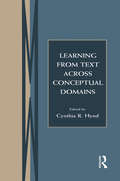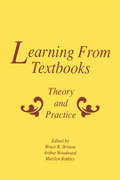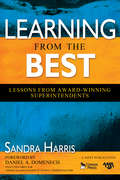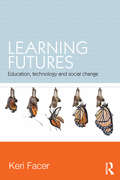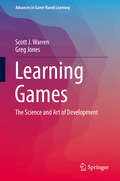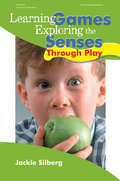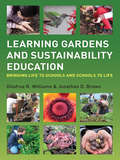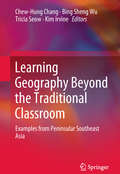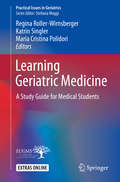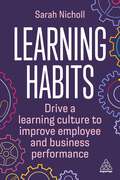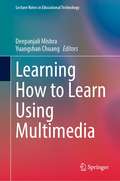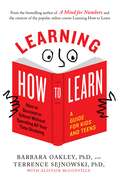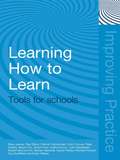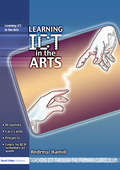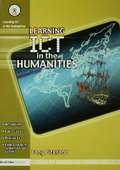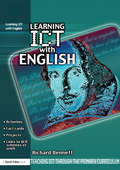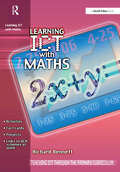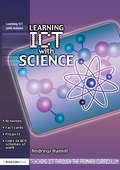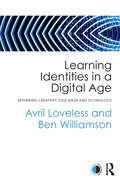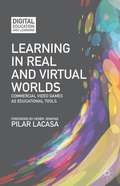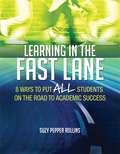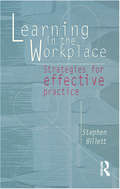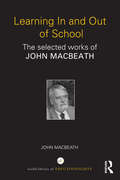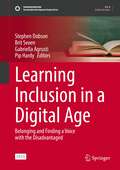- Table View
- List View
Learning From Text Across Conceptual Domains
by Steven A. Stahl Cynthia R. Hynd Shawn M. Glynn Martha CarrThis volume is an attempt to synthesize the understandings we have about reading to learn. Although learning at all ages is discussed in this volume, the main focus is on middle and high school classrooms--critical spaces of learning and thinking. The amount of knowledge presented in written form is increasing, and the information we get from texts is often conflicting. We are in a knowledge explosion that leaves us reeling and may effectively disenfranchise those who are not keeping up. There has never been a more crucial time for students to understand, learn from, and think critically about the information in various forms of text. Thus, understanding what it means to learn is vital for all educators. Learning from text is a complex matter that includes student factors (social, ethnic, and cultural differences, as well as varying motivations, self-perceptions, goals, and needs); instructional and teacher factors; and disciplinary and social factors. One important goal of the book is to encourage practicing teachers to learn to consider their students in new ways--to see them as being influenced by, and as influencing, not just the classroom but the total fabric of the disciplines they are learning. Equally important, it is intended to foster further research efforts--from local studies of classrooms by teachers to large-scale studies that produce generalizable understandings about learning from text. This volume--a result of the editor's and contributors' work with the National Reading Research Center--will be of interest to all researchers, graduate students, practicing teachers, and teachers in training who are interested in understanding the issues that are central to improving students' learning from text.
Learning From Textbooks: Theory and Practice
by Bruce K. Britton Arthur Woodward Marilyn BinkleyIt is surprising that there is so little research on textbooks, given their centrality to teaching and learning in elementary and secondary schools. Textbooks have become a focus of political and cultural controversy, advocating a multicultural curriculum that has sparked some vigorous protests. Research is absent in this debate; therefore, questions of legitimate knowledge, the role of textbooks, textbook design, policy selection issues, and economic issues concerning the marketplace are not part of the current debate. Without insights of research on considerate text, mentioning, illustrations and so forth, the current controversy will result in publishers responding to demands for more content not less; thus, textbooks will become compendia of information that on the surface satisfy everyone. This volume demonstrates how research on important issues relative to textbook design can advance our knowledge about what makes textbooks effective learning tools, and thus inform policymakers, publishers, and those involved in textbook selection. Representing pure and applied approaches, researchers present papers on the quality of writing, the role of questions, the role of pictures and illustrations, and the role of auxiliary materials in the design of effective textbooks. The chapters provide insight into research and its application to textbook design and improvement -- stimulating others to follow this lead.
Learning From the Best: Lessons From Award-Winning Superintendents
by Sandra Harris"Provides a rare opportunity to get inside the heads of the best superintendents in the country. Harris′ book captures essential craft knowledge that every superintendent needs to succeed in the job."—Robert S. McCord, Associate Professor of Educational LeadershipUniversity of Nevada, Las Vegas"An excellent book for experienced and new superintendents. I kept coming across little nuggets and big ideas that I couldn′t wait to implement immediately."—Janie L. Nusser, SuperintendentSouth Seneca Central School District, NYWords of wisdom for achieving effective district leadership!In today′s challenging educational environment, superintendents need proven strategies that will help them lead their schools and districts successfully. This topical resource offers a collection of proven best practices from award-winning superintendents.Representing school districts with diverse populations, school sizes, and communities, 22 current and former superintendents from around the country detail in their own words the practices that have been central to their professional and districtwide success. Readers can learn from the wisdom and experience of these outstanding leaders on topics such as:Transformational leadership that provides direction for the district Community building, outreach, and effective partnershipsResponding to changing times, changing standards, and student needsDeveloping strategies for overcoming barriers to effective reformLearning From the Best is a valuable resource for new and experienced superintendents seeking to steer their districts through today′s most pressing educational issues.
Learning Futures: Education, Technology and Social Change
by Keri FacerIn the twenty-first century, educators around the world are being told that they need to transform education systems to adapt young people for the challenges of a global digital knowledge economy. Too rarely, however, do we ask whether this future vision is robust, achievable or even desirable, whether alternative futures might be in development, and what other possible futures might demand of education. Drawing on ten years of research into educational innovation and socio-technical change, working with educators, researchers, digital industries, students and policy-makers, this book questions taken-for-granted assumptions about the future of education. Arguing that we have been working with too narrow a vision of the future, Keri Facer makes a case for recognizing the challenges that the next two decades may bring, including: the emergence of new relationships between humans and technology the opportunities and challenges of aging populations the development of new forms of knowledge and democracy the challenges of climate warming and environmental disruption the potential for radical economic and social inequalities. This book describes the potential for these developments to impact critical aspects of education – including adult-child relationships, social justice, curriculum design, community relationships and learning ecologies. Packed with examples from around the world and utilising vital research undertaken by the author while Research Director at the UK’s Futurelab, the book helps to bring into focus the risks and opportunities for schools, students and societies over the coming two decades. It makes a powerful case for rethinking the relationship between education and social and technological change, and presents a set of key strategies for creating schools better able to meet the emerging needs of their students and communities. An important contribution to the debates surrounding educational futures, this book is compelling reading for all of those, including educators, researchers, policy-makers and students, who are asking the question 'how can education help us to build desirable futures for everyone in the context of social and technological change?'
Learning Games
by Scott J. Warren Greg JonesThis book provides an overview of the design and development of learning games using examples from those created by the authors over last decade. It provides lessons learned about processes, successful approaches, and pitfalls that befall developers of learning games and educational transmedia experiences. The book includes stories from the authors' lives that give context to why and how they built these products to help the reader understand whether or not building a learning game is right for them and what challenges they might face. It also gives a framework for thinking ethically about design and research when it comes to designing complex digital systems like educational games.
Learning Games: Exploring the Senses Through Play
by Jackie SilbergHow do children learn about the world around them? They touch, taste, see, smell and hear it, of course! With over 200 activities, Learning Games will delight children as they expand their learning by engaging all of their senses. The chapters are organized by each of the five senses, with a bonus chapter of multi-sensory activities. The games and activities are designed to help children identify and use their senses-essential tools for understanding the world. Games Include: Partner Listening Paper Plate Shakers I've Got a Rhythm Dolphin Talk Listening to Paper The Binocular Game Color My World Glowing Mobile Walking Through Africa Magnify Your Life No Hands Fingerpaint with Textures Nose, Nose Smelly Walk Tongue Bumps Sweet or Sour Tasting in Space Let's Taste Red Taste Picture Book Body Part Senses Senses for the Hand
Learning Gardens and Sustainability Education: Bringing Life to Schools and Schools to Life
by Jonathan Brown Dilafruz WilliamsOffering a fresh approach to bringing life to schools and schools to life, this book goes beyond touting the benefits of learning gardens to survey them as a whole-systems design solution with potential to address myriad interrelated social, ecological, and educational issues. The theoretical and conceptual framework presented creatively places soil at the center of the discourse on sustainability education and learning garden design and pedagogy. Seven elements and attributes of living soil and learning gardens are presented as a guide for sustainability education: cultivating a sense of place; fostering curiosity and wonder; discovering rhythm and scale; valuing biocultural diversity; embracing practical experience ; nurturing interconnectedness. The living soil of learning gardens forms the basis of a new metaphoric language serving to contest dominant mechanistic metaphors presently influencing educational discourse. Student voices and examples from urban schools provide practical understanding of how bringing life to schools can indeed bring schools to life.
Learning Geography Beyond the Traditional Classroom: Examples From Peninsular Southeast Asia
by Chew-Hung Chang Bing Sheng Wu Tricia Seow Kim IrvineThis book provides a collection of critical pieces that support the idea that good teaching and learning of geography in fieldwork and using technology should consider the dimensions of curriculum design, instructional design and resource provision, as well as assessment for such learning activities. Further, it clearly describes the thinking, experiences and critical comments concerning two broad areas of learning outside the traditional classroom – in the field and with technology.
Learning Geriatric Medicine: A Study Guide For Medical Students (Practical Issues in Geriatrics)
by Regina Roller-Wirnsberger Katrin Singler Maria Cristina PolidoriThis textbook presents hands-on training material for medical students. The style reflects the need for practice-based teaching with a modern edge in daily clinical routine; accordingly, it also employs online material and pocket cards. Each chapter begins with specific learning objectives, which are cross-referenced with the European curriculum for undergraduate medical education released by the European Union of Medical Specialists (UEMS) together with the European Union Geriatric Medicine Society (EUGMS), as well as the minimum geriatric competences for medical students established by the American Geriatrics Society (AGS). World-renowned European experts in practicing and teaching the interdisciplinary field of Geriatrics contributed to this work, with the aim of offering the new generation of health professionals a global perspective on one of the greatest public health challenges of our time: the management of the steadily increasing number of older, multimorbid, and vulnerable persons. The major strength of this book – published under the auspices of the EUGMS – is its pragmatic, goal-oriented approach, which makes it suitable for bedside learning and patient-centered medicine; further, all of the chapters are firmly based on the pillars of the ageing process in all of its biological aspects, helping readers understand the pathophysiology of and rationale behind interventions for the main geriatric syndromes and disorders.
Learning Habits: Drive a Learning Culture to Improve Employee and Business Performance
by Sarah NichollA learning culture is essential to outperform the competition but how can Learning and Development (L&D) professionals achieve this? What habits do they need to develop in their workforce? Learning Habits is written by an author with over 20 years' experience using learning science to improve both business and employee outcomes. It explains what habits are necessary for an effective learning culture and how to develop them at individual, team and organizational levels. This book outlines each habit, explains what it is, why it makes a difference and how to measure it as well as providing a framework that can be used to make these habits become routine to ensure the learning sticks. Each habit is underpinned by behavioural science research and supported by practical advice, real world examples and case studies from global organizations. Learning Habits also includes checklists to track progress, a 'cue, routine, reward, reflect' model to make learning habits core to how the business operates and templates for measurement. This book is essential reading for all L&D practitioners who know that building a learning culture is crucial for individual and business success but don't know where to start.
Learning How to Learn Using Multimedia (Lecture Notes in Educational Technology)
by Deepanjali Mishra Yuangshan ChuangThis book introduces the concept of multimedia in education, and how multimedia technology could be implemented to impart digital education to university students. The book emphasizes the versatile use of technology enabled education through the research papers from distinguished academicians and researchers who are specifically working in this area. It benefits all those researchers who are enthusiastic about learning online and also for those academicians who are interested to work on various aspects of learning and teaching through technology.
Learning How to Learn: How to Succeed in School Without Spending All Your Time Studying; A Guide for Kids and Teens
by Barbara Oakley Terrence Sejnowski Alistair McConvilleA surprisingly simple way for students to master any subject--based on one of the world's most popular online courses and the bestselling book A Mind for NumbersA Mind for Numbers and its wildly popular online companion course "Learning How to Learn" have empowered more than two million learners of all ages from around the world to master subjects that they once struggled with. Fans often wish they'd discovered these learning strategies earlier and ask how they can help their kids master these skills as well. Now in this new book for kids and teens, the authors reveal how to make the most of time spent studying. We all have the tools to learn what might not seem to come naturally to us at first--the secret is to understand how the brain works so we can unlock its power. This book explains: * Why sometimes letting your mind wander is an important part of the learning process * How to avoid "rut think" in order to think outside the box * Why having a poor memory can be a good thing * The value of metaphors in developing understanding * A simple, yet powerful, way to stop procrastinatingFilled with illustrations, application questions, and exercises, this book makes learning easy and fun.
Learning How to Learn: Tools for Schools (Improving Practice (TLRP))
by Mary James David Frost Peter Dudley Sue Swaffield Dylan Wiliam Paul Black Robert McCormick Patrick Carmichael Bethan Marshall John MacBeath Alison Fox Richard Procter David Pedder Colin Conner Leslie HonourLearning how to learn is an essential preparation for lifelong learning. This book offers a set of in-service resources to help teachers develop new classroom practices informed by sound research. It builds on previous work associated with ‘formative assessment’ or ‘assessment for learning’. However, it adds an important new dimension by taking account of the conditions within schools that are conducive to the promotion, in classrooms, of learning how to learn as an extension of assessment for learning. Among the materials included you will find: an introductory in-service session self-evaluation questionnaires an action planning activity workshops tools for school development a network mapping activity guidance about different ways of using the resources teachers descriptions of ways they have used of adapted them references to further information and advice. In addition, there is a support website and examples of how individual schools have used or adapted these materials to maximize their benefits.
Learning ICT in the Arts (Teaching ICT through the Primary Curriculum)
by Andrew HamillProviding practical guidance on enhancing learning through ICT in the arts, this book is made up of a series of projects that supplement, augment and extend the QCA ICT scheme and provide much-needed links with Units in other subjects’ schemes of work. It includes: examples and advice on enhancing learning through ICT in art, music, drama and design technology fact cards that support each project and clearly outline its benefits in relation to teaching and learning examples of how activities work in 'real' classrooms links to research, inspection evidence and background reading to support each project adaptable planning examples and practical ideas provided on an accompanying CD ROM. This book is invaluable reading for all trainee and practising primary teachers.
Learning ICT in the Humanities (Teaching ICT through the Primary Curriculum)
by Tony PickfordProviding practical guidance on enhancing learning through ICT in the humanities, this book is made up of a series of projects that supplement, augment and extend the QCA ICT scheme and provide much-needed links with Units in other subjects’ schemes of work. It includes: examples and advice on enhancing learning through ICT in history, geography and RE fact cards that support each project and clearly outline its benefits in relation to teaching and learning examples of how activities work in 'real' classrooms links to research, inspection evidence and background reading to support each project adaptable planning examples and practical ideas provided on an accompanying CD ROM. Suitable for all trainee and practising primary teachers.
Learning ICT with English (Teaching ICT through the Primary Curriculum)
by Richard BennettProviding practical guidance on enhancing learning through ICT in English, this book is made up of a series of projects that supplement, augment and extend the QCA ICT scheme and provide much-needed links with Units in other subjects’ schemes of work. It includes: fact cards that support each project and clearly outline its benefits in relation to teaching and learning examples of how activities work in 'real' classrooms links to research, inspection evidence and background reading to support each project adaptable planning examples and practical ideas provided on an accompanying CD ROM. This book is highly recommended for all trainee and practising primary teachers.
Learning ICT with Maths (Teaching ICT through the Primary Curriculum)
by Richard BennettProviding practical guidance on enhancing learning through ICT in maths, this book is made up of a series of projects that supplement, augment and extend the QCA ICT scheme and provide much-needed links with Units in other subjects’ schemes of work. It includes: fact cards that support each project and clearly outline its benefits in relation to teaching and learning examples of how activities work in 'real' classrooms links to research, inspection evidence and background reading to support each project adaptable planning examples and practical ideas provided on an accompanying CD ROM. Suitable for all trainee and practising primary teachers.
Learning ICT with Science (Teaching ICT through the Primary Curriculum)
by Andrew HamillProviding practical guidance on enhancing learning through ICT in science, this book is made up of a series of projects that supplement, augment and extend the QCA ICT scheme and provide much-needed links with Units in other subjects’ schemes of work. It includes: fact cards that support each project and clearly outline its benefits in relation to teaching and learning examples of how activities work in 'real' classrooms links to research, inspection evidence and background reading to support each project adaptable planning examples and practical ideas provided on an accompanying CD ROM. This book is essential reading for all trainee and practising primary teachers.
Learning Identities in a Digital Age: Rethinking creativity, education and technology (Changing Times In Education Ser.)
by Avril Loveless Ben WilliamsonDigital media are increasingly interwoven into how we understand society and ourselves today. From lines of code to evolving forms of online conduct, they have become an ever-present layer of our age. The rethinking of education has now become the subject of intense global policy debates and academic research, paralleled by the invention and promot
Learning Identities, Education, and Community
by Julian Sefton-Green Ola Erstad Erstad, Ola and Gilje, Øystein and Sefton-Green, Julian and Arnseth, Hans Christian Øystein Gilje Hans Christian Arnseth"This book offers a case study of children and young people in Groruddalen, Norway, as they live, study and work within the contexts of their families, educational institutions and informal activities. Examining learning as a life-wide concept, the study reveals how 'learning identities' are forged through complex interplays between young people and their communities, and how these identities translate and transfer across different locations and learning contexts. The authors also explore how diverse immigrant populations integrate and conceptualize their education as a key route to personal meaning and future productivity. In highlighting the relationships between education, literacy and identity within a sociocultural context, this book is at the cutting edge of discussions about what matters as children learn"--
Learning In Real And Virtual Worlds
by Pilar LacasaPacked with critical analysis and real-life examples, this book explores how video games can cultivate learning. Lacasa takes several commercial video games and shows how they can be used both in and out of the classroom to teach initiative and problem-solving, encourage creativity, promote literacy, and develop reasoning skills. The result of almost ten years spent discovering video games, learning to play, conversing with their designers and distributors, and working in the classroom with young people and teachers, Lacasa's work uncovers the educational value already present in commercial video games and shows how to integrate games for learning purposes into the curriculum. It is invaluable for anyone wishing to discover the cultural and educational value of this new form of entertainment in an interdisciplinary environment in which psychology, sociology, art, literature, graphic design, and computer programming are all present.
Learning In The Fast Lane: 8 Ways To Put All Students On The Road To Academic Success
by Suzy Pepper RollinsToo often, students who fail a grade or a course receive remediation that ends up widening rather than closing achievement gaps. According to veteran classroom teacher and educational consultant Suzy Pepper Rollins, the true answer to supporting struggling students lies in acceleration. In Learning in the Fast Lane, she lays out a plan of action that teachers can use to immediately move underperforming students in the right direction and differentiate instruction for all learners—even those who excel academically. This essential guide identifies eight high-impact, research-based instructional approaches that will help you <p><p> * Make standards and learning goals explicit to students. <p> * Increase students' vocabulary—a key to their academic success. <p> * Build students' motivation and self-efficacy so that they become active, optimistic participants in class. <p> * Provide rich, timely feedback that enables students to improve when it counts. <p> * Address skill and knowledge gaps within the context of new learning. <p> Students deserve no less than the most effective strategies available. These hands-on, ready-to-implement practices will enable you to provide all students with compelling, rigorous, and engaging learning experiences.
Learning In The Workplace: Strategies for effective practice
by Stephen BillettLearning in the workplace has come of age with the publication of this book. It shows the way for a new level of sophistication in the ways learning and work are treated. And it opens new territory for exploration in the world of learning throughout life.David Boud, University of Technology, SydneyStephen Billett provides a comprehensive and practical model, well-grounded in theory and research, to guide learning in the workplace. This is a 'must read' for those in vocational education and training.Victoria Marsick, Columbia UniversityLearning does not stop when you leave school or tertiary studies, but continues throughout life. The workplace is now seen as an important learning environment, and businesses and government units are encouraged to become 'learning organisations'. This is all very well in theory, but how does learning actually occur in the workplace?Drawing on research of a wide variety of workplaces in different countries, Stephen Billett analyses the strengths and limitations of 'on-the-job' learning. He outlines what knowledge individuals need and how they can best acquire this knowledge in workplace settings. He shows how to develop a workplace curriculum, and how it can be implemented in organisations of different sizes. Learning in the Workplace offers a comprehensive pedagogy for the workplace. It is a valuable reference for human resource practitioners and students in courses on professional development and adult and vocational learning.
Learning In and Out of School: The selected works of John MacBeath
by John MacBeathIn the World Library of Educationalists series, international experts themselves compile career-long collections of what they judge to be their finest pieces - extracts from books, key articles, salient research findings, major theoretical and practical contributions - so the world can read them in a single manageable volume.John MacBeath has spent
Learning Inclusion in a Digital Age: Belonging and Finding a Voice with the Disadvantaged (Sustainable Development Goals Series)
by Stephen Dobson Pip Hardy Gabriella Agrusti Brit SvoenThis open access book considers how inclusive learning, wellbeing and active citizenship can be encouraged, taught, learnt, and supported in a digital world. The book poses and seeks to address three questions: How can governments and intergovernmental organisations support learning inclusion and active citizenship? How can the education sector and public/private enterprises support learning inclusion and active citizenship? How can professionals and communities work with vulnerable adults who are disadvantaged in a participatory, empowering manner? The Examples discussed in the book draw on the experiences of adult refugees and migrants, as well as people who may experience disadvantage and/or discrimination as a result of their social, economic, political, cultural, religious, physical, mental, age or gender-related status. One methodological pillar in this work is the development of skills in digital storytelling and digital stories creation for personal, community and professional purposes. Conceptually and of interest for researcher and policy makers at local, national and transnational levels, this book brings together a number of related concepts to generate innovative understanding and practices of applied relevance in the age of the pandemic and its aftermath.
